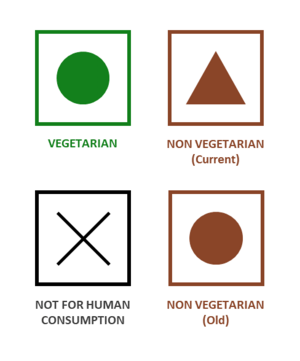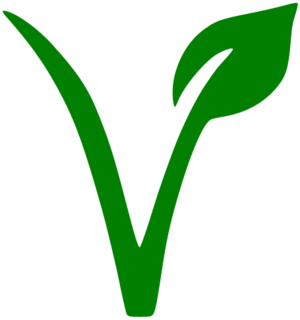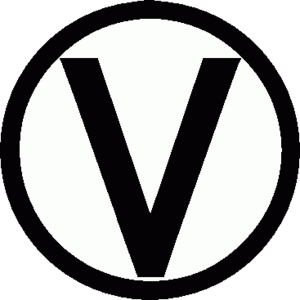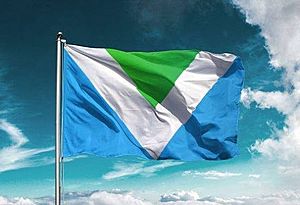Vegetarian and vegan symbolism facts for kids
Multiple symbols have been created to show what vegetarianism and veganism mean. You might see some of these symbols on food packaging. For example, there's the Vegan Society trademark or the V-Label. The Indian government also uses special marks for vegetarian and non-vegetarian foods. People who are vegetarian or vegan also use these symbols to show their identity and to support animal rights.
Contents
Vegetarian Symbols
Indian Food Marks
In India, all packaged food and even toothpaste must have a special mark. This mark helps people know if the product is lacto-vegetarian (contains milk, but no meat or eggs) or non-vegetarian.
This rule started with the Food Safety and Standards Act of 2006. It became mandatory in 2011. The law says that vegetarian food must have a green symbol, and non-vegetarian food must have a brown symbol.
Here's what the symbols look like:
- Vegetarian food: A green circle inside a green square. This symbol is placed clearly on the package.
- Non-vegetarian food: (This includes any food with parts of animals, birds, fish, or eggs, but not honey or milk products). It used to be a brown circle inside a brown square.
In 2021, the FSSAI changed the non-vegetarian symbol. They did this because some people with color blindness found it hard to tell the old symbols apart. The new non-vegetarian symbol is a brown triangle inside a brown square.
The FSSAI also announced a new symbol for vegan food in September 2021.
The V-Label
The V-Label is a special symbol that looks like a "V" with a leaf. It was created by the European Vegetarian Union. This label helps people easily find vegan and vegetarian products and services all around the world.
Vegan Symbols
The Vegan Trademark
The Vegan Trademark has a sunflower design and is known worldwide. It comes from The Vegan Society, which is the group that first used the word 'vegan'. This trademark helps people easily find products that are vegan. It was the first system to check and approve vegan products, starting in 1990.
The Enclosed V
The enclosed v symbol is very popular, especially on social networks. It looks like a small "v" inside a circle (Ⓥ). This symbol is not used to label products as vegan, and you shouldn't rely on it to know if a product is vegan.
Seedling Emoji
On the internet, like on forums and social media, the seedling emoji 🌱 is sometimes used. People use it to show that something is vegan or related to veganism.
Veganarchy Symbol
The Veganarchy symbol combines two ideas. It mixes the "Circle-V" (for vegan) with the "Circle-A" (which is a symbol often used by anarchist groups). It first appeared in a pamphlet in 1995.
The Vegan Flag
The vegan flag was designed by a group of graphic designers and activists from different countries. The group was started by Gad Hakimi, a vegan activist from Israel. He wanted the flag to be a civil flag to represent veganism.
The flag has three triangles in blue and green that form the letter "V." This "V" stands for "vegan."
At first, some people in the group thought about putting animals on the flag or using red colors to show the blood of animals. But the group decided to make the flag about equality between humans and animals, not just about animals themselves.
The flag was inspired by the LGBT rainbow flag. The goal was to help unite different animal rights groups and activists.
The colors white, green, and blue were chosen to represent the natural homes of animals: the sky, the land, and the sea. The letter "V" stands for Vegan. It's shaped like an upside-down pyramid, which is meant to show that it's possible to do things that seem impossible.
Images for kids
-
Vegan graffiti showing an Enclosed V in Lisbon, Portugal
See also
 In Spanish: Simbolismo vegetariano y vegano para niños
In Spanish: Simbolismo vegetariano y vegano para niños
 | Precious Adams |
 | Lauren Anderson |
 | Janet Collins |









